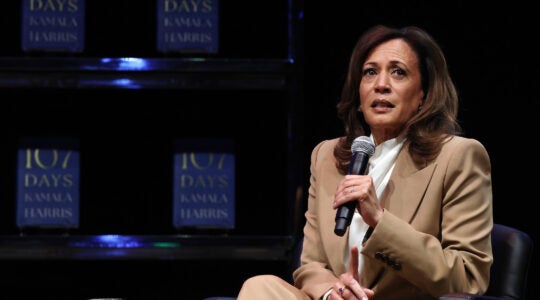WASHINGTON (JTA) — Is it discriminatory for government to fund some forms of discrimination and not others? And what does “funding” mean?
These questions are at the center of a case concerning the right of a Christian student group to recognition on its campus.
The Christian Legal Society’s quest for official status at the University of California’s Hastings College of Law has wound its way through the courts and now is under consideration by the U.S. Supreme Court. The court took up the case in December; it has yet to set a date for hearings.
On the Orthodox side, Agudath Israel of America and the Orthodox Union have filed separate briefs friendly to the Christian Legal Society. So has the National Council of Young Israel, joining a brief that includes Muslim, Christian and Sikh groups.
The Anti-Defamation League and the American Jewish Committee are planning to file separate briefs friendly to the university. The American Jewish Congress chose not to file a brief.
The Orthodox vs. secular alignment is not unusual in such church-state cases. However, subtle differences over the case’s ramifications and over strategy have emerged between groups on the same side.
The crux of the dilemma for Jewish groups is whether the greater threat to Jews is posed by groups that exclude — or marginalizing groups that exclude. The Christian Legal Society requires a signed commitment to what it defines as Christian principles, including proscribing premarital sex and defining marriage as being exclusively between a man and a woman. The sociey wants Hastings, which receives state and federal funds, to allocate it the same funding due other on-campus groups and it wants equal access to campus facilities.
The Orthodox Union’s brief emphasizes the threat that the law school’s lower court victories pose to the ability of OU’s student affiliates, the National Conference of Synagogue Youth and the Jewish Student Union, as well as other Jewish student associations, to control membership and leadership.
“A Jewish campus organization such as Hillel would be compelled to admit adherents of Jews for Jesus into its membership,” the OU brief says. “Not only would such requirements redefine the group, they would likely drive away members who wish to congregate with co-religionists, free from proselytizing.”
Nathan Diament, the OU’s Washington director and its counsel in this case, said the school’s refusal to recognize the Christian society violated the group’s constitutional rights.
“They are excluding this group because of a viewpoint,” he said. “This is a state university, and the state is not entitled under the First Amendment, under the free exercise of religion or freedom of association to say these are the conditions under which to exercise your rights.”
For the ADL, the danger lies in the prospect of federal funding for a group that not only requires Christian commitment but the exclusion of gays.
“We really see this is as a discrimination case,” said Deborah Lauter, ADL’s civil rights director. “What if a club formed that said no Jews? Any organization that says they’re opposed to Jews, women, blacks, gays — if CLS succeeds, public-funded universities will have to fund it.”
The ADL and Agudah, from opposing sides, see far-reaching consequences for funding for faith groups in general. The Orthodox Union and the American Jewish Committee see the case more narrowly affecting student activities.
Lauter says the case has ramifications for the efforts by Jewish civil rights groups to get the Obama administration to make good on promises to restrict faith-based funding for social activism to groups that do not proselytize or discriminate in their hiring.
“This would open the door up for federal funds to be used to discriminate in the hiring and firing of people,” Lauter said. “It’s antithetical to democracy.”
The AJC joined the ADL in its letter this month to the White House regarding faith-based funding, but Richard Foltin, the AJC’s legislative director, said the Hastings case was unrelated.
“I wouldn’t say one motivates the other,” he said.
In fact, Foltin said, AJC was driven to file an amicus brief because the Christian society insists on receiving the same direct funding from the university that other groups receive. Had the society simply asked for the same on-campus status of other groups — access to space and facilities, Foltin said — AJC might not have joined the case.
Lauter says ADL sees any university sanction of the group as crossing a line.
“There’s no distinction — once you open the door up, it’s open,” she said, adding that the Christian society was free to meet off-campus.
Similarly, whereas the Orthodox Union’s brief focuses principally on the ramifications for student groups, Agudah tells the Supreme Court in its brief that upholding lower courts’ decisions favoring Hastings would have dire consequences for expression of faith generally.
“Applying these laws to Orthodox Jewish schools and synagogues, federal, state or local governments could relegate Orthodox Jews and our institutions to second-class status, ineligible to participate equally in society,” the Agudah brief says. “Such a result cannot be reconciled with our nation’s foundational concept of religious freedom.”
Abba Cohen, Agudah’s Washington director, counted off the programs that could be adversely affected, including state and federal assistance for disabled students, remedial teaching, disaster relief and homeland security assistance for securing Jewish institutions.
“So much of our religious life involves separation between the sexes and services and activities that are exclusive to the Jewish faith,” he said. “This really hits at the heart of our religious practice.”
Hastings’ inclination to protect gays from discrimination — a key factor cited repeatedly in the university’s brief — is a matter of “contemporary mores” and not law, Cohen argues.
“One would need a much, much higher level of state interest to infringe upon” the rights of religious groups, he said. “You’re dealing with association rights, free speech rights, you’re dealing with the very things which make religion what it is.”
The AJCongress’ board debated whether to file a brief, but found itself torn between the dangers each side sees and decided against, said Marc Stern, the group’s legal counsel and acting executive director.
Stern says the dilemma reflects broader Jewish community tensions.
“Does Jewish security lie in eliminating any vestige of discrimination in a public space?” he asked, “or does it lie in people drawing lines for ideological reasons to meet privately?”
JTA has documented Jewish history in real-time for over a century. Keep our journalism strong by joining us in supporting independent, award-winning reporting.





